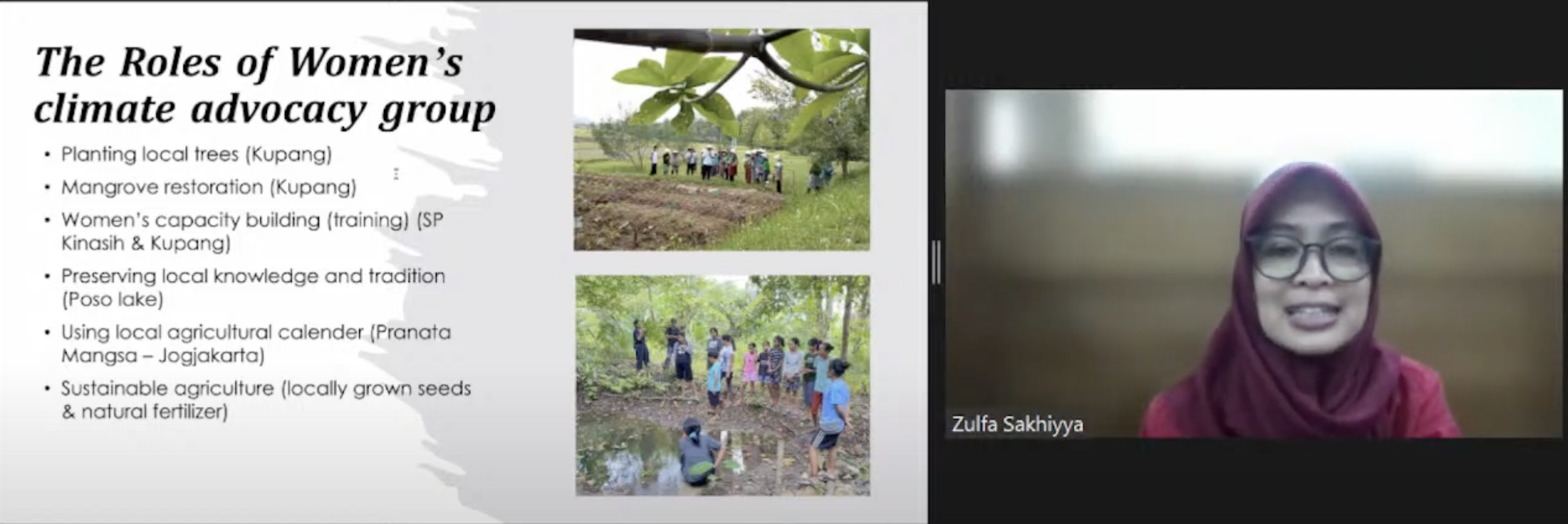FKP hosted by Indonesian Regional Science Association (IRSA) with Haiyun Nisa (Universitas Syiah Kuala) and Zulfa Sakhiyya (Universitas Negeri Semarang). Wednesday, 31 July 2024.
KEY POINTS:
- The IRSA Research Support on Gender Inequality and Climate Change highlights the need for research on gender equality in climate resilience. Zulfa Sakhiyya’s presentation, “Gendering Climate Resilience,” argues against viewing women solely as victims of climate change which obscures deeper inequalities in decision-making and resource access. Her study, which reviewed 54 climate policies, found limited inclusion of gender considerations, and she calls for a gender-responsive approach to climate adaptation that strengthens collaboration.
- Haiyun Nisa’s presentation, “Eco-Anxiety: The Impact of Climate Change on Women’s Mental Health in Aceh, Indonesia,” examines the psychological effects of climate change, particularly “eco-anxiety,” on women in disaster-prone areas. The study reveals a significant link between climate change and mental health issues, with many women experiencing increased anxiety and depression. It advocates for targeted mental health interventions and policies that address the unique challenges women face.
SUMMARY
- There is a pressing need for research endeavors aimed at improving gender equality, mitigating the effects of climate change. The IRSA Research Support on Gender Inequality and Climate Change aimed to inspire and facilitate research activities dedicated to addressing the intertwined issues of gender inequality and climate change in Indonesia. With the award, IRSA encourages young and early career academics to take up research in these critical areas and foster a community of researchers committed to finding solutions and collectively work towards a more equitable and sustainable future for Indonesia and the world at large.
- In Indonesia, environmental decisions are inherently political, influenced by various social categories such as gender, race, and class. In her presentation, titled “Gendering Climate Resilience,” Zulfa Sakhiyya challenges the common portrayal of women as mere victims of the climate crisis. Instead, it argues that such a view distracts from deeper inequalities in decision-making, resource access, and institutional norms that limit women’s capacity to contribute to climate resilience. This argument is based on a study which involved reviewing 54 climate policies and collaborating with women’s climate organizations across Indonesia, found that only seven of these policies mentioned “gender” or “women,” and even those did so superficially without implementing meaningful actions toward inclusive climate adaptation.
- The lack of gender-responsive policies fails to recognize the valuable contributions that women’s community groups already make in enhancing resilience. emphasizes that climate policies often fail to consider these dimensions, which results in inadequate responses to the needs and capabilities of different social groups, particularly women. Therefore one of the policy recommendation that came out based on this study is advocacy for a gender-responsive approach to climate adaptation, which includes providing equal access to social protection and climate adaptation programs. Strengthening collaboration between state agencies and grassroots organizations is essential to building more inclusive and effective climate resilience strategies. Recognizing women’s agency and innovation in this context is crucial for developing comprehensive policies that address the multifaceted challenges posed by climate change.
- Haiyun Nisa’s presentation, “Eco-Anxiety: The Impact of Climate Change on Women’s Mental Health in Aceh, Indonesia,” delves into the psychological dimensions of climate change, focusing specifically on women in Aceh, a region with a high disaster risk due to its history of conflicts, earthquakes, and tsunamis. This study introduces the concept of “eco-anxiety,” which refers to a chronic fear of environmental catastrophe. This anxiety disproportionately affects women, who are often expected to assume additional responsibilities during crises.
- The significant association between climate change and mental health issues among Aceh women, as shown by the high levels of depressive symptoms reported by participants, is one of the findings of the study. Women who already face societal expectations to manage household responsibilities are further burdened during climate crises, intensifying their psychological distress. The data also showed that even those who are professionally employed, continue to carry the primary responsibility for domestic tasks, which compounds their stress and anxiety.
- The research findings underscore the need for a deeper understanding of how climate change affects mental health, particularly among women. The researcher calls for targeted mental health interventions and policies that address the unique psychological needs of women affected by climate change. It is also important to educate communities about balancing household responsibilities and promoting gender equality as a vital component of climate adaptation strategies. By doing so, policymakers can empower women and men to develop resilience skills and reduce vulnerability to climate-induced mental health issues.







